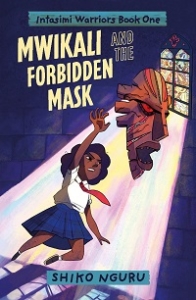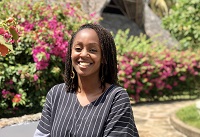Make way for the Instasimi Warriors
 Mwikali and the Forbidden Mask by Shiko Nguru, book one in the Instasimi Warriors series, is a Kenyan fantasy series inspired by East African mythology. Nguru’s debut, it is published by Lantana, and launches their new fiction list.
Mwikali and the Forbidden Mask by Shiko Nguru, book one in the Instasimi Warriors series, is a Kenyan fantasy series inspired by East African mythology. Nguru’s debut, it is published by Lantana, and launches their new fiction list.
Sue McGonigle spoke to Shiko Nguru for Books for Keeps to find out more about the book and its background.
Can you introduce Mwikali and the Forbidden Mask to our readers?
Mwikali and the Forbidden Mask follows a twelve-year-old girl Mwikali, who has never quite fitted in anywhere. She moves back to her mother’s home country Kenya, a country that she has never lived in, and joins a new school. She meets up with three other kids and discovers that she is part of an ancient bloodline of legendary Kenyan warriors, and she finds out about her history and her powers. It is a journey of self-discovery to understand who she is in order to better understand and use her superpower. It is ok to be different, it is ok to be unique – in the context of fighting an evil superpower!
Mwikali is centre stage in this first volume, is she based on anyone you know or on yourself?
Like Mwikali I moved schools quite a bit, I felt a misfit. I lived in the US for ten years and had to move back to Kenya. All these elements – which culture do I belong to, where do I fit in, am I a fraud because I don’t know that much about my own culture, were pulled into the character of Mwikali.
Which books were important to you as a child?
When I was growing up, I loved adventure and mystery with the discovery of hidden elements – adventure has always been my thing. I read The Famous Five, The Hardy Boys, Nancy Drew and The Chronicles of Narnia. There was very little literature written by Kenyan authors or African authors that I was interested in as a child that I found fun or exciting. Now I almost exclusively read and watch sci fi fantasy, I am a huge fan.
This is your debut as an author. What prompted you to write a book for children?
 Growing up I was always a reader, but I never ever imagined myself as a writer. I went onto Uni and studied History and Political Science. Then when I came home to Kenya, I wrote as a hobby and I started a blog. It was only when I had my own children, and my daughter grew up that I realised the books she reads and the books I read as a child have zero representation. There are no kids that look like her. Looking at the books she was reading I thought that isn’t right. That was one element. I wanted my kids to see themselves in the books they read.
Growing up I was always a reader, but I never ever imagined myself as a writer. I went onto Uni and studied History and Political Science. Then when I came home to Kenya, I wrote as a hobby and I started a blog. It was only when I had my own children, and my daughter grew up that I realised the books she reads and the books I read as a child have zero representation. There are no kids that look like her. Looking at the books she was reading I thought that isn’t right. That was one element. I wanted my kids to see themselves in the books they read.
I started home schooling my daughter around two to three years ago and I had her whole curriculum planned out – Maths, English, Science, but when it came to history, I couldn’t find any exciting, engaging and informative books. She knew more about Zeus and Poseidon than legendary characters in our own history. I had no idea about it in school either. We are basically taught about our colonial history and fighting for independence, we are rarely taught about our precolonial history, which is so rich. I decided to write a series of short stories that would teach my daughter and other Kenyan kids about their history in a way that was exciting and interesting – and I thought I am really enjoying this!
Can you tell us about your writing process how you research and whether you have a routine.
For the book I did a lot of talking to family especially my dad – he was a huge resource. He grew up in a village so I asked him what he would do on a typical day, what would the boys do, what would the girls do. I carried out a lot of interviews with my dad and his peers. A lot of our literature is passed down through oral stories, which is very poetic and imaginative but so much of it gets lost. Several collections of stories have now been written to convert that oral literature into written – I read a lot of these books. The research is difficult but it’s like a treasure hunt, you find gems. It wasn’t easy but it was a joy to do and has given me ideas for more stories to come.
My creative juices are most concentrated and free flowing in the morning, so I am a morning writer. If I can wake up and start writing straight away that’s best. I have daily targets of about 1000 words. From noon onwards my brain is flat but that is when I like to do my outlining or brainstorm different ideas with sci fi or fantasy on in the background.
What do you hope readers will gain from your book?
Mwikali is definitely about self-acceptance and that it’s ok to be different. For Kenyan children I wanted them to learn about our history and culture and for it to be relatable to modern kids too, I wanted them to see themselves in everyday life in modern Kenya.
My whole thing I think, is encouraging all children everywhere to explore the world and different cultures through reading, especially the parts that don’t get enough representation. Literature from different parts of the world helps everybody. I love sharing both our past and our present because I enjoy reading about other people’s culture and history. When I was young, I used books to explore the world and I would like kids from other parts of the world to explore Kenya through my books.
I think there is a space in literature for children in Japan or in the UK to learn about what life is like in Kenya through books, and I would hope that is something that my book can do. To find out what a kid in Kenya does, what kind of pop music they listen to, the snacks they eat, to go home and wonder what a mandazi tastes like or to say, ‘Oh they like flavoured milk!’
My publisher, Lantana was the perfect fit for me as a writer, their whole thing is diversity and inclusion, having them eager to look for these stories from all over the world is such a blessing.
This is book one in an Instasimi Warriors series – are the other books already planned out?
There are going to be four books – I know which main character will come next. I have a clear idea of which legendary character I wanted to base each of them on – and I’ve thought about what their superpower would look like and how it would manifest itself in a 12-year-old kid. I don’t know the exact story yet but the one thing I know for sure is what the main characters are going to be like and what their superpowers are based on. I hope kids can’t wait to read about the Intasimi warriors!
Sue McGonigle is an independent consultant and co-creator of Lovemybooks.
Mwikali and the Forbidden Mask by Shiko Nguru is published by Lantana, 978-1915244031, £7.99 pbk.



